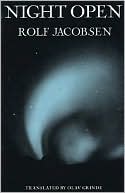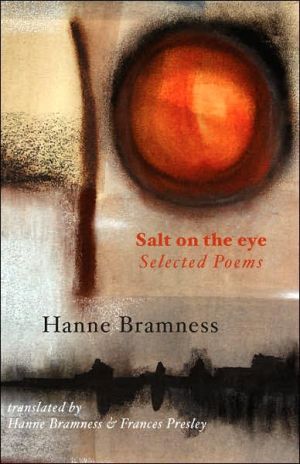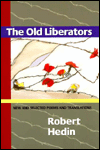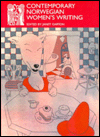North in the World: Selected Poems of Rolf Jacobsen, A Bilingual Edition
North in the World presents 121 poems by Rolf Jacobsen (1907-1994), one of Norway's greatest modern poets. Garnering the highest praise of critics, Jacobsen won many of Norway's and Sweden's most prestigious literary awards, including the Swedish Academy's Dobloug Prize and the Grand Nordic Prize, also known as the "Little Nobel." But he also has earned a wide popular audience, because ordinary readers can understand and enjoy the way he explores the complex counterpoint of nature and...
Search in google:
North in the World presents 121 poems by Rolf Jacobsen (1907-1994), one of Norway's greatest modern poets. Garnering the highest praise of critics, Jacobsen won many of Norway's and Sweden's most prestigious literary awards, including the Swedish Academy's Dobloug Prize and the Grand Nordic Prize, also known as the "Little Nobel." But he also has earned a wide popular audience, because ordinary readers can understand and enjoy the way he explores the complex counterpoint of nature and technology, progress and self-destruction, daily life and cosmic wonder.Drawing from all twelve of his books, and including one poem collected posthumously, North in the World offers award-winning English translations of Jacobsen's poems, accompanied by the original Norwegian texts. The translator, the American poet Roger Greenwald, worked with Jacobsen himself to correct errors that had crept into the Norwegian texts over the years. An in-depth introduction by Greenwald highlights the main features of Jacobsen's poetry, and extensive endnotes, as well as indexes to titles and first lines in both languages, enhance the usefulness of the book for general readers and scholars alike. The result is the definitive bilingual edition of Jacobsen's marvelous poetry.Publishers WeeklyAs translator and American poet Roger Greenwald (Connecting Flight) explains in his introduction to the bilingual volume North in the World: Selected Poems of Rolf Jacobsen, Jacobsen (1907-1994) was one of the first Norwegians to write in unrhymed free verse, to use colloquial speech and to draw on contemporary urban scenes and experiences. These poems, drawn from throughout Jacobsen's career, frequently take up new technologies and the relationship between nature and the man-made world. "Under the gutter gratings, under the moldy stone cellars, under the damp roots of avenues with linden trees and the parks' lawns: The telephone cables' nerve fibers. The gas pipes' hollow veins. Sewers." (Apr.) Copyright 2002 Cahners Business Information.
NORTH IN THE WORLD \ SELECTED POEMS OF ROLF JACOBSEN \ \ By Rolf Jacobsen \ The University of Chicago Press \ Copyright © 1999 Gyldendal Norsk Forlag ASA\ All right reserved.\ ISBN: 978-0-226-39035-2 \ \ \ \ \ Chapter One \ Regn Himlen har stillet sin harpe på skrå mot jorden og rører de tusen strenger med døvende vellyd, løfter de store klemt over skog og sletter med lekende hender. Over de nakne marker går jeg og trår på jorden og kjenner hvor regnet driver om kneet, mulden puster mot foten, mens himlen legger de tynne striper av jern tonende over mitt hjerte. Regn var det første. Øglene bet mot regn. Langsmed de støvgrå sumper gynget de fuktige trær. Papegøiene kaklet. Himmelens flyvefisker rodde sig skrikende frem gjennem regn. Gro, sovende land med den brune, blødende jord, gro! Mett dig med havets såkorn, løft dig og brist av regn. Himmelens harpe rører de tusen strenger, fyller det lyttende øre med levende låt. Over det store, syngende billedteppe veves av milde hender, snakkende drømmer. Regn var det første sansene skjønte på jorden -susende regn. Rain The sky has rested its harp aslant on the earth and is moving the thousands of strings in deafening harmony, lofting great chords above forest and steppe with playful hands. Across the bare fields I go treading the earth and feel how the rain drives at my knees, the loam breathes on my foot as the sky sets its thin iron stripes ringing over my heart. Rain was the first thing. The dinosaurs snapped at rain. Humid trees swayed beside dust-gray swamps. Parrots cackled. The flying fish of the sky paddled forward, shrieking, through rain. Grow, sleeping land with your brown, bleeding earth, grow! Eat your fill of the ocean's seed grain, swell and burst with rain. The sky's harp moves the thousands of strings, fills the listening ear with living song. Across the great, singing tapestry gentle hands weave speaking dreams. Rain was the first thing the senses grasped on the earth -rushing rain. Myr Spettet ut over landet ligger de gule myrer som flekker av pest. Gråbleke i regnet og med tåkehette brer de sin tristhet som endeløse hav mellem tynne skoger. Rødflammet og mosegule ligger de i solskinnet og slikker himlen med sin tunge av søt os. Og noen kranser sig med unge bjerker, som flokker av lyse piker står de og grer sitt hår over lyngtuene. Og noen hyller sig i en krave av brennende blomster som de lokker til sig ut av skogene, i en have av mjødurt, storkenebb og hvit skogstjerne. Og alle har de denne besettende ånde, denne bitre lukt av søt vin. Mange mil gjennem skogen kan jeg kjenne den som en bedøvelse for min tanke. Marshes Spotted out over the land the yellow marshes lie like patches of plague. Sallow gray in the rain and with cowls of fog they spread their sadness like endless seas among thin forests. Streaked red and moss-yellow they lie in the sunshine and lick the sky with their tongues of sweet odor. And some garland themselves with young birches, like groups of fair girls they stand combing their hair over the islets of heather. And some wrap themselves in a collar of flaming flowers they lure out of the woods: in a garden of meadowsweet, cranesbill and white wintergreen. And they all have this engrossing breath, this bitter smell of sweet wine. Many miles through the forest I can feel it anesthetizing my thought. Skyene Skyene ruller. Skyene går og kommer søvngjengerstille ut fra uendeligheten, belte bak belte og tog bak tog, og skifter farve på jorden. Og noen dager er det koldt-ett sted. Og noen dager er det varmt-ett sted. En dal blir rød i øst. En dal blir blå i vest så langt den går. Skyene ruller. Belte kommer bak belte og tog bak tog og skifter farve på jorden. Og dagen reiser i tunnell, sånn: -blink, blink, blink. Og under kikhullene kommer en mann ut og sier: "Nei for en sommer vi får." Og under skyggeflekkene blir jorden grå som graven. Skyene ruller. Skyhavet beveger sig. Sol-toppet, skumrevet, hvitt i lag på lag og siler lyset på menneskene og legger ny farve på deres ansikter. Noen blir røde som blod. Noen blir gustne som sopp i skogen. Noen blir hvite som sne og noen gule som honning. The Clouds The clouds roll on. Silent as sleepwalkers the clouds keep coming from infinity, bank behind bank and line after line, and change colors on the earth. And some days it's cold-somewhere. And some days it's warm-somewhere. A valley turns red in the east. A valley turns blue in the west as far as it reaches. The clouds roll on. Bank comes behind bank and line after line and change colors on the earth. And the day travels in a tunnel, thus: -blink, blink, blink. And under the peepholes a man comes out and says: "This sure will be one fine summer." And under the shadow-patches the earth turns gray as the grave. The clouds roll on. The cloud-ocean moves. Sun-capped, foam-reefed, white layer upon layer. And filters the light onto people and sets new color on their faces. Some become red like blood. Some become pale like mushrooms in the forest. Some become white like snow and some yellow like honey. Reise Stasjonsventesaler om natten med den kjølige atmosfære av rå cement og jern, med rekker av visnede smørbrød under glassdiskene, opstablede stoler i skyggen, vaskekonenes strøm over perrongene i den fuktige morgentime, kan fylle min sjel med villhet. Reise mot fremmede lande. Røk gjennem kupévinduene, skinnenes magiske sanger.-Paris, Marseille. Når asfalten har krystet mine føtter til glør, når butikkvinduenes glitrende øine har mistet sin trolldom og min verden står stille og bare stirrer på mig, da går jeg ofte til jernbanestasjonene hvor de hvite røksøiler setter glade spørsmålstegn på himlen, eller til havnen hvor de store skib ligger med duft av maling og hav og skinner av lys. Jeg vil ride på stavnen av et slikt skib inn mot en ny by. Jeg vil høre på bølgene pusle om skrogets plater når vi glir med sakte fart inn mot de disige tårne og de gamle broer gjennem røk. Og jeg vil høre gatenes larm stige, sporvognene klemte i nye, rare toner. Jeg vil kjenne lukten av kastanjeknopper drive mot havnen. Kastanjeknopper og exhaust. Travel Station waiting rooms at night with the cool atmosphere of raw cement and iron, with rows of wilted sandwiches under glass counters, stacked-up chairs in the shadows, charwomen streaming down the platforms in the damp morning hour, can fill my soul with wildness. Travel to foreign lands. Smoke through compartment windows, the magic song of the rails.-Paris, Marseilles. When the asphalt has pressed my feet into live coals, when the shopwindows' glittering eyes have lost their spell and my world stands still and just stares at me, then I often go to the railway stations, where the white columns of smoke set lively question marks in the sky, or to the harbor, where the great ships lie with a fragrance of paint and ocean, shining with lights. I want to ride on the bow of such a ship in toward a new city. I want to hear the waves slosh on the hull's plates as we glide in toward hazy towers and old bridges at slow speed through smoke. And I want to hear the street-noise rising, the trolley cars clanging in new, strange notes. I want to pick up the smell of chestnut buds drifting toward the harbor. Chestnut buds and exhaust. Eftermiddagen Bilen stanser på hjørnet. Gaten er hvit og stille. Gardinenes dovne faner vaier over en verden av skygge og støv. Øde er alle spisestuer nu. Sølvvaser glimter på røde mahognybuffeter i halvmørke. På tunge, svaktglødende buffeter i skygge står kobberfat med frukt. Nu er det at alle de selsomme mønstre våkner. Silkeskjermenes påfugl. Broderienes blomsterakre. Støvsylfidene leker i skoger av ekeblader. Og fra det kinesiske tempel strømmer det lav musikk. Øde er alle spisestuer nu. Det er timen da du hviler middag, borger. Bare den store buffeten din lever og silkeskjermen og blomstervasen. Mens gulvteppestøvet danser i strålen fra gatens nytente lykter. Båter uler på havnen. Ute er fortauene våte. Afternoon A car stops at the corner. The street is white and still. The curtains' lazy banners flutter over a world of shadow and dust. All the dining rooms are empty now. Silver vases glimmer on red mahogany buffets in half-darkness. On heavy, faintly shining buffets in the shadows stand copper plates of fruit. Now is when all the singular patterns awaken. Peacocks on the silk screens. Embroidered fields of flowers. The dust-sylphs play in forests of oak leaves. And from the Chinese temple soft music flows. All the dining rooms are empty now. It's the hour when you rest after dinner, burgher. Only this big buffet of yours is alive and the silk screen and the flower vase. While the dust of the carpet dances in the beam from the streetlights, just lit. Boats blow horns in the harbor. Outside the sidewalks are wet. Speilglass På vår seilas med trikken ut til løvetann og syriner blev vi sittende fast i speilglass i en lang osende kanal. Vi la et blått kjølvann bak oss gjennem rutenes blinkende brenning da vi blev hyllet inn i skygge og så var vi på byens havbund. Over takenes bølgetopper så vi maisolen lyse, men i de hemmelighetsfulle sunkne paradiser så vi unge piker av voks. I de strålende, fortryllede akvarier lå gaudaostenes gule møllestener, røkelaks og sprø, duftende roquefort med grønne perler. Og bak de stirrende speilglass-øine (fuktige av gatens gjennemtrekk) korseletter, min herre, og bysteholdere av silkerips. La løvetannen lyse. La trikken seile med sitt kjølvann. -Jeg er strandet på et koralrev og lar havets champagne bevifte mine gjellespalter. Plate Glass On our sailing trip by trolley out to dandelions and lilacs we got stuck in plate glass in a long streaming canal. As we left a blue wake behind us through the glittering swell of the panes, we were enveloped in shadow and ended up on the city's seabed. Above the wave-crests of the roofs we saw the May sun shining, but in the mysterious sunken paradise we saw young girls of wax. In the sparkling, bewitched aquariums lay yellow millstones of Gouda cheese, smoked salmon, and crumbly, fragrant Roquefort beaded with dew. And behind the staring plateglass eyes (watering from the draft) corsets, dear sir, and brassieres of ribbed silk. Let the dandelions shine. Let the trolley sail on with its wake. -I am stranded on a coral reef and let the sea's champagne flutter the slits of my gills. Byens metafysikk Under rennestensristene, under de skimlete murkjellere, under lindealléenes fuktige røtter og parkplenene: Telefonkablenes nervefibre. Gassledningenes hule blodårer. Kloakker. Fra østens skyhøie menneskealper, fra vestens villafasader bak spirea -de samme usynlige lenker av jern og kobber binder oss sammen. Ingen kan høre telefonkablenes knitrende liv. Ingen kan høre gassledningenes syke hoste i avgrunnen. Ingen kan høre kloakkene tordne med slam og stank hundrede mil i mørke. Byens jernkledde innvolder arbeider. Men oppe i dagen danser jo du med flammende fotsåler over asfalten, og du har silke mot navlens hvite øie og ny kåpe i solskinnet. Og oppe i lyset etsteds står jo jeg og ser hvordan cigarettens blå sjel flagrer som en kysk engel gjennem kastanjeløvet mot det evige liv. Metaphysics of the City Under the gutter gratings, under the moldy stone cellars, under the damp roots of avenues with linden trees and the parks' lawns: The telephone cables' nerve fibers. The gas pipes' hollow veins. Sewers. From skyscraping human Alps in the east, from spirea-hedged façades in the west -the same invisible links of iron and copper bind us together. No one can hear the telephone cables' crackling life. No one can hear the gas pipes' sick coughing in the abyss. No one can hear the sewers thunder with slime and stench for a hundred miles in darkness. The city's ironclad entrails are at work. But up in the day you, of course, are dancing over the asphalt with the soles of your feet on fire, and you have silk against your navel's white eye and a new coat in the sunshine. And up in the light somewhere I, of course, stand and watch how the cigarette's blue soul flutters like a chaste angel through the chestnut leaves toward eternal life. Industridistrikt Det er i jordens oldtid -at ditt vindu lukkes op mot morgenen i murbergene og knirker på sine hasper og slipper inn lukten av kalk og ny brand mot dine varme laken, -at ditt øre fanger den langsomme lyd av en dampmaskin like i nærheten, lufthamrenes gjø over takene, den hule hoste fra gater du ikke kan se gjennem røken, -at ditt øie møter de store marker av uld, jernvanger, tomter med koks under sparsom sol. Fabrikkskorstener med kroner av gul røk, -at ditt hjerte brister i drøm: Dinosaurene, hornøglene, løfter de tynne halser over forstenede sumper og gresser i skyenes tak av løv, -at din tanke med ett fylles av lys og våkner: "Idag skal jeg ut og kjøpe nye sko." Industrial District It is in the earth's prehistory -that your window is opened to morning amid mountains of walls and creaks on its hinges and lets the smell of lime and new fire drift in toward your warm sheets, -that your ear catches the slow sound of a steam engine nearby, of jackhammers barking over the roofs, the hollow cough from streets you can't see through the smoke, -that your eye meets the vast fields of dust, iron meadows, lots with coke under thin sun. Factory chimneys with yellow crowns of smoke, -that your heart bursts into dream: The dinosaurs, the horned lizards, raise their thin necks over petrified swamps and graze in the canopy of leafy clouds, -that your mind is filled at once with light and awakens: "Today I'm going out and buying new shoes." Jernbaneland 1 Lysfaner henger fra kuppelen ned over boggivogntakene. Solslyngplantene vifter sakte over kontinentaltoget. Åtte røksorte boggier dufter cigar og mahogny. Trallene ramler på stenen. Dampen skjuler oss alle. Føttene klaprer, mennesker vrimler og snakker. Veldige lokomotiver opløfter sin vrede stemme. Strøm gjennem korridorene, tyst over gummiløpere. Hundrede ansikter her, bak vegger av teak-tre bleke som voks, lesende, skapt i guds billede. Speilglassrutene klirrer, svakt knirker boggifjærene. Snart skal hjulene spille sitt heftige accellerando. Nu ligger de lydløst og ruger på skinnenes nakke. *** Godsvogner. Tusen rekker side om side i søvnen. Tunge floder som furer sletten av stål og jern. Under presenninger slåmaskiner og tømmer. Brekkvognenes mørke gate hvor kornet og fisken bor. Tømmer fra duftende skoger fløtet på langsomme elver, hugget på moer i måneskinn fraktet på sne. Railroad Country 1 Banners of light from the cupola hang down over the roofs of the coaches. A foliage of heat mirages flutters slowly above the Continental. From eight smoke-black coaches waft the scents of cigar and mahogany. Baggage carts rumble on the pavements. Steam envelops everyone. Feet clatter, people mill around talking. Powerful locomotives raise up their angry voices. A streaming through the corridors, muted on rubber runners. Hundreds of faces here behind walls of teakwood, pale as wax, reading, made in god's image. The plateglass windows rattle, the truck-springs creak faintly. Soon the wheels will play their mighty accelerando. Now they sit silently brooding on the railhead. *** Freight cars. A thousand rows side by side, asleep. Heavy rivers to furrow a prairie of steel and iron. Under tarpaulins mowing machines and timber. The boxcars' dark street housing the fish and the grain. Timber from fragrant forests floated on leisurely rivers, hewn in clearings by moonlight, hauled over snow. Floder av tre, floder av jern som sover venter på solopgangens hvite, smeltende lys. Da skal skredene løsne, skinnene gjespe og sprake. Tusen koblinger strekkes mot milenes sluk. 2 Skinnene, blinkende, brune grener sig ut over landet over de tjærete sviller, gjennem de kløverrøde bakker. Inn i de klamme tunneller høit over klirrende broer, gjennem den øde, ropende mo hvor timian vifter i gruset, og gyldenrød tiriltunge duver ved skinnekanten. Der snuser den røde vimsende maur og klatrer i skinnenes rust. Sanden ligger og lyser med oljeflekker og mønje. Mellem de tunge, osende sviller vokser kamilleblomsten. \ (Continues...)\ \ \ \ \ Excerpted from NORTH IN THE WORLD by Rolf Jacobsen Copyright © 1999 by Gyldendal Norsk Forlag ASA. Excerpted by permission.\ All rights reserved. No part of this excerpt may be reproduced or reprinted without permission in writing from the publisher.\ Excerpts are provided by Dial-A-Book Inc. solely for the personal use of visitors to this web site. \ \
AcknowledgmentsIntroductionRain4Marshes6The Clouds8Travel10Afternoon12Plate Glass14Metaphysics of the City16Industrial District18Railroad Country20The Northern Lights30Rubber34Europe36Heredity and Environment38Vibrating Telephone Poles40Gaslight44Coke46Cobalt48Sunflower50Express Train52My Tree54Day and Night56In the Varald Forest58Pavane64Landscape with Steam Shovels66The Age of the Great Symphonies68The Lonely Balcony70The Archaeologist72Timber74Guardian Angel76The Old Ladies78Old Age80The Inverted Summer82Midsummer Night's Light84Turnip Crop86Meadowsweet88Mournful Towers90Stave Churches92Hand and Mouth96The Moon and the Apple Tree98Old Men's Graves100Nightbird102A Second Sun104Green Light106The Foundryman of Waterfalls108Mirror Lakes110Where Do the Streets Go?112In Countries Where the Light Has Another Color114The Sculptor116In the Hall of Gobelin Tapestries118Letter to the Light122In January124Night Window128Blind Song132Now the River Is Carrying Off Its Lights138The Memory of Horses140Small Lights at Sea142Old Clocks144The Silence in Trees146Glass Soldiers148The Towers in Bologna150The Catacombs of San Callisto154Slowly -158The Silence Afterwards160The Dark of Night162Thoughts upon Listening In on a Radio Telescope164Unthinking -166Avignon, Vaucluse168Waiting Time172Hush -174Peasant Norway176Some178Girlchild -180Signs of Winter184End of the Road186To Iris188Green Man192Knives Knives194Angelus196Briefing198Epilogue: For an etching: "Aurora,"200Skylab204A Glass House206Antenna-forest208Avaldsnes210Old Cities in Auvergne212Needles, Thread and Yarn214Hallingskeid216Blind Words220Sand222Without a Sound224In Raspberry Season226From Above, from Below and from the Side228The History of Stone230We Who Live near the Railway232Fasten Your Seat Belts -238The Images242The Media Poem244Come On -248Look Up (N.B. N.B.)250In Every Forest254You Bird -256To You258On Falling Asleep in a Field260Beyond Grorud -262Hundvako264Mountain Rule266- More Mountains268The Bells from Assisi270"Silvery Moon"272The Inland Line276[Part Way]280Trees in Autumn282Thoughts at Lake Sjodal284Suddenly. In December286Room 301288Barbed-wire Winter290The Sewing Machine292Did I Know You?294It Was Here -296Fireflies298A Poem on the River Glama302Notes305Index of Titles321Index of First Lines325
\ Publishers WeeklyAs translator and American poet Roger Greenwald (Connecting Flight) explains in his introduction to the bilingual volume North in the World: Selected Poems of Rolf Jacobsen, Jacobsen (1907-1994) was one of the first Norwegians to write in unrhymed free verse, to use colloquial speech and to draw on contemporary urban scenes and experiences. These poems, drawn from throughout Jacobsen's career, frequently take up new technologies and the relationship between nature and the man-made world. "Under the gutter gratings, under the moldy stone cellars, under the damp roots of avenues with linden trees and the parks' lawns: The telephone cables' nerve fibers. The gas pipes' hollow veins. Sewers." (Apr.) Copyright 2002 Cahners Business Information.\ \





